- 8:00 am-4:00 pm Monday - Friday
24/7 Emergency Service Available - 107 Action Ln, Summerville, SC 29483
- actionac@hotmail.com
- 107 Action Ln, Summerville, SC 29483
- actionac@hotmail.com
Quick Quote
South Carolina is one of the most beautiful places in the United States to call home. However, our local weather can be extreme - high temps and thick humidity in the summer and chilly winter weather during cold months. As a local HVAC company in Johns Island, SC, we know how crucial it is to have a quality HVAC system in your home and experienced technicians to keep it working correctly.
With more than 35 years of serving the Lowcountry, we are proud to be an active part of our local community. As your neighbors, we are here for all of your HVAC needs, whether you need a new AC unit installed this summer or a heat pump replacement this winter. With a reliable team of NATE-certified technicians and decades of experience in our industry, no HVAC project is too big or small for us to handle.
We offer highly competitive pricing and convenient financing options for all of our clients. At the end of the day, our goal is to make it easy and affordable to live comfortably in your home all year long. We are committed to hard work, honesty, and integrity with every service we offer. If you aren't 100% satisfied with our work, we'll do our part to make it right.
Service Areas
Here are just a few of the reasons why homeowners and business owners in South Carolina trust Action Heating & Air Conditioning:
- We have been serving clients in South Carolina since 1983 - before many of our clients were even born!
- We provide a wide range of HVAC services for both heating and air conditioning.
- We are committed to giving our clients the highest quality products and services at affordable prices.
- As a Carrier® Factory Authorized Dealer, we have the best HVAC units available.
- We are members of the South Carolina Association of Heating and Air Conditioning Contractors.
- We are members of our local Chamber of Commerce and the Air Conditioning Contractors of America.
If you need a trusted AC repair company in Johns Island, know that our team is geared up and ready to help you today. While you browse our website, have a look at just a few of our specialties here at Action Heating & Air Conditioning:
Air Conditioning Repair in Johns Island, SC
Summers in the Lowcountry are hot, humid, and sticky. After a long day at the beach or downtown with your friends, nothing feels better than kicking back on the sofa while your air conditioning cools you off. On the other hand, nothing feels worse than walking into your home and feeling warm, stale air hit your face. Those who know, know - having your AC go out during a South Carolina summer is no joke. With time, a relatively minor inconvenience can turn into a real health problem.
In situations like these, something has probably gone wrong with your HVAC system. If your AC has stopped working in the middle of summer, it's time to call Action Heating & Air Conditioning right away. Our team of certified HVAC professionals has years of experience repairing and servicing AC equipment. It doesn't matter how old your unit is or what brand you bought - we have the skills to get your home comfort system up and running in no time.

Here are just a few of the AC issues that our talented team can help solve for you:
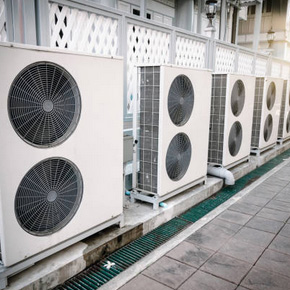
Air Conditioning Drainage Block
Over time, condensation builds up in your AC equipment because of its cooling process. This accumulated byproduct must be drained regularly, or the increased amounts of moisture can damage your air conditioner's components.
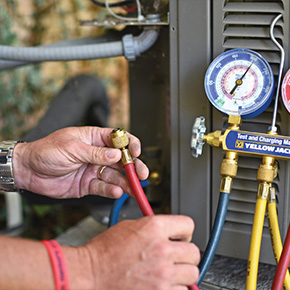
Air Conditioning Refrigerant Leak
Refrigerant is the substance responsible for keeping your home nice and cool in the summer. When refrigerant levels drop due to a leak, it will affect your AC equipment's ability to cool your home. If your HVAC unit isn't blowing cold air, this could be a reason why.
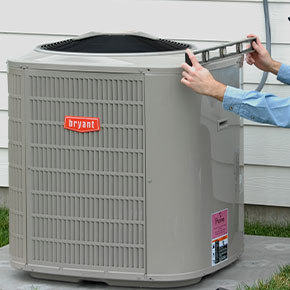
Heater Keeps Running
This is a common AC issue in South Carolina and the U.S. in general. Sometimes this problem is fixed by switching your thermostat to "auto." If that doesn't work, you may have a broken thermostat or a wiring issue that needs to be addressed quickly.
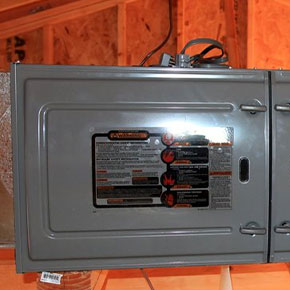
Burning Odors
It's normal for your heater to produce a slight burning smell if it hasn't been used in a while. However, if you are experiencing a persistent burning smell during the summer months when your air conditioning is on, it could be a serious problem. Turn off your HVAC system immediately and call our office as soon as possible so that we may send out a technician to diagnose your problem.
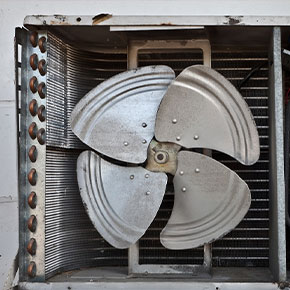
Broken Air Conditioning Compressor Fan
This fan plays an important role in your AC unit's heat transfer process. When your air conditioning fan breaks, your AC equipment won't be able to cool your home off in the summer when it's needed the most.
Our Special Offers
One of our goals as a company is to provide HVAC repair services at fair and competitive prices. In addition, we want you to feel confident about investing in high-quality heating and cooling systems without having to worry a lot about the costs. We make sure to provide honest and accurate quotes and we offer a variety of financing options. We want you to get the best bang for your buck, so here are some special offers.
See Our OfferIf you are experiencing any of the problems above, be sure to hire a professional contractor to fix your issues. For your safety, don't ever try to make HVAC repairs on your own unless you are trained. When the time come to have your air conditioning system repaired, our team of licensed AC technicians will handle all of the hard work on your behalf. That way, you can stay safe and have peace of mind knowing you're in good hands.
Air Conditioning Install in Johns Island, SC
Your HVAC system works hard all year long. If you have gone years without much maintenance or AC repair, you probably bought a great HVAC unit. However, with constant use and even normal wear and tear, even the highest-quality HVAC systems are prone to malfunctions. Eventually, it will need to be replaced.
If you need an energy-efficient, reliable cooling system for your home or business, you have come to the right place. We have decades of experience installing new AC systems for our clients and can handle any installation project you have. As a Carrier® Factory Authorized Dealer, we have the most top-rated AC systems available in South Carolina.
At Action Heating & Air Conditioning, we know that buying a new air conditioner and installing it can be a huge source of stress. But when you work with us, it doesn't have to be that way. We have made it our mission to make the AC installation process easy and efficient for our customers. That way, they can focus more on living life and enjoying their home while we work hard on their AC install in Johns Island.
Whether you plan to replace a faulty air conditioning system or need a Carrier unit for your new construction home, we have got you covered. We will work with you directly to find the best fit for your home and budget. We are also happy to answer all of your AC installation questions prior to and during your initial service appointment.

Common Signs That You Need a New AC Install in Johns Island, SC
Trying to figure out whether your air conditioner needs to be repaired or replaced can be a tricky decision to make. Most people have a hard time letting things go, and that includes AC units. It can be hard to know when to let go of the old and welcome in the new. To help save you time and make your decision a little easier, keep the following signs in mind. If you find yourself saying, "that sounds like my AC unit," it might be time for a new air conditioning installation.

Protecting Your Investment
Your air conditioning system works very hard every day, all year long to keep your home comfy and cool. Machines that work hard year-round are going to require maintenance and ongoing services to stay operational.
As a family-owned and operated HVAC company in Johns Island, SC, we know better than anyone how expensive it can be to maintain an AC unit. We know that money doesn't grow on trees. We also understand that finding last-minute resources to fix an air conditioning system can be challenging. That is why we offer extended warranties for your new or existing AC equipment. With an extended warranty from Action Heating & Air Conditioning, you benefit from repairs, replacement, and additional services covered under warranty. That way, you can enjoy your HVAC products as long as possible.

If you're having second thoughts about purchasing an extended warranty, consider these points:
- Generally speaking, HVAC equipment lasts anywhere from 10 to 15 years. However, warranties provided by the factory will often expire before the service life of your cooling unit is over. With an extended warranty, your indoor comfort system is covered even if the factory warranty expires.
- Having an extended warranty on your AC system gives you the chance to project and plan for any HVAC costs. This helps you balance your budget and anticipate expenses so you aren't caught off guard. Having a warranty will also help protect your budget against increases in labor and parts costs due to inflation.
- If you're thinking of selling your home, having an extended warranty may help raise your home's value. You may also be able to transfer your extended warranty to your new home if you choose to do so.
Latest News in Johns Island, SC
Johns Island woman receives keys to new home from Habitat for Humanity
Carlie Bakerhttps://www.live5news.com/2024/03/01/johns-island-woman-receives-keys-new-home/
JOHNS ISLAND, S.C. (WCSC) - A woman neighbors describe as a staple of the community has a new home thanks to a group of volunteers.Sea Island Habitat for Humanity celebrated another closing on Johns Island Friday, handing over the keys for the second house they completed this year to Clareatha Matthews.Matthews says she has been waiting for this day to come. She previously lived in a trailer right behind her new home for almost 40 years. On average, trailers are only supposed to last 10 to 15 years.Matthews is an active ...
JOHNS ISLAND, S.C. (WCSC) - A woman neighbors describe as a staple of the community has a new home thanks to a group of volunteers.
Sea Island Habitat for Humanity celebrated another closing on Johns Island Friday, handing over the keys for the second house they completed this year to Clareatha Matthews.
Matthews says she has been waiting for this day to come. She previously lived in a trailer right behind her new home for almost 40 years. On average, trailers are only supposed to last 10 to 15 years.
Matthews is an active member of the community and has been a resident of John’s Island since 1989. She is involved in multiple Bible studies and has worked at the John’s Island Subway for 20 years now.
“Oh my god today means so much to me. I have been blessed and truly blessed for this day. I have been waiting for this day,” Matthews says.
The project to build her home began in September. When a new homeowner is picked, they are required to work a certain amount of “sweat equity” hours by working with volunteers to help build their own home. Matthews was required to work 300 and volunteers say she continued to come out and work on her house even when her required hours were completed.
“She is just a staple. She is a very active part of this community, and she was also very involved in her habitat sweat equity hours. Continuing to come out and help work on her house even after she finished her hours,” Construction site supervisor Kali Tanguay says.
She also said that they have seen some new homeowners in the past fall short on their hours or not want to commit, but that Matthews went above and beyond.
Her friends and family came out to celebrate and help Matthews move in. Her daughters said their mother worked three jobs when they were growing up and that she never complained. They said that she deserved this greatly.
“We owe our entire life to Habitat for Humanity. It’s very special because my mom is such a dependable, hardworking, and deserving lady and it’s good to see her just totally happy,” Matthew’s daughter, Veronica Huggins, says.
Sea Island Habitat for Humanity completes an average of five to six houses per year and they are hoping to see that number continue to grow.
Copyright 2024 WCSC. All rights reserved.
Vandalism causes 60-gallon diesel spill on Johns Island: Charleston Water System
Ian Kayanja & Claire Weberhttps://abcnews4.com/news/local/vandalism-causes-60-gallon-diesel-spill-on-johns-island-charleston-water-system-south-carolina-enviormental-news-wciv-abc-news-4-2024
CHARLESTON COUNTY, S.C. (WCIV) — Clean-up efforts are underway after vandalism resulted in a 60-gallon diesel fuel spill on Johns Island, officials with Charleston Water System said Monday.The diesel fuel spilled into a stormwater ditch behind homes along Colonel Harrison Drive that leads to the Stono River. Residents initially discovered and smelled the fuel spill over the weekend. The South Carolina Department of Health and Environmental Control was called on Sunday to help with the spill.Read more: ...
CHARLESTON COUNTY, S.C. (WCIV) — Clean-up efforts are underway after vandalism resulted in a 60-gallon diesel fuel spill on Johns Island, officials with Charleston Water System said Monday.
The diesel fuel spilled into a stormwater ditch behind homes along Colonel Harrison Drive that leads to the Stono River. Residents initially discovered and smelled the fuel spill over the weekend. The South Carolina Department of Health and Environmental Control was called on Sunday to help with the spill.
Read more: "Successful oil spill cleanup in Charleston by Coast Guard, no marine life threats."
“Our contractor cleaned up a portion of the spill, immediately called in a professional environmental remediation company, and notified SC DHEC and the EPA’s National Response Center,” said Mike Saia, Charleston Water System's public information administrator. “It may take several days for them to recapture all remnants of the fuel.”
This is the third instance of vandalism to contractor equipment in recent weeks, and the Charleston County Sheriff's Office is investigating.
“I mean it is a very, in depth vandalism. It's not just a rock through the window. It’s someone who came out here to destroy this 200-something thousand-dollar machine,” said Chad Hunter, owner of Hunter Landworx Construction, the contractor onsite.
Hunter showed up to his Johns Island job site Monday expecting to quickly finish a project he’s been working on since October. Instead, he found his machinery completely vandalized.
“There are wires in there, cut and hidden like that. We wouldn't be able to find it if we didn't see that all the fuel around it, my guys would've gotten in the machine. He put rocks and all in our engine to try to blow the engine up,” Hunter said.
But the damage doesn’t stop there.
Read more: "Suspicion arises over two Colleton County mobile home fires in three days."
The vandalism led to a 60-gallon diesel fuel spill into the surrounding area along the Stono River. Charleston Water System owns the construction project, and its staff says they’ve never seen damage this bad.
“We don't see a lot of vandalism. If we do, it's very, very minor, and easy to repair. But this is a different situation because not only did the person damage the equipment related to the job, but they've also damaged the environment,” Saia said.
Saia said they were able to soak up as much of the liquid fuel as possible and the Coast Guard confirmed to CWS that the spill didn't reach the river.
Now, Hunter must pick up the pieces.
He said the damage to his machine alone will cost a few hundred thousand dollars and his crews are now behind on all their current projects.
“We're out here to clean up somebody's mess as well as take time from our family and slow down the project. I mean, it's hurting everybody, the neighborhood, everything around us is just getting messed up from one person,” Hunter said.
“One hour's worth of work is causing weeks of fix-up.”
News 4 has reached out to CCSO for more information.
Crews continue work on water main breaks that caused road damage
Melissa Rademakerhttps://www.live5news.com/2024/02/12/crews-continue-work-water-main-breaks-that-caused-road-damage/
JAMES ISLAND, S.C. (WCSC) - Crews are continuing to work to repair two major water main breaks that happened within a day of each other on James Island and in West Ashley.Public Information Administrator for Charleston Water System Mike Saia says while the collapsed ground looks like a sinkhole, the damage didn’t happen that way in a technical sense. The damage to the ground and roads is from the strong water pressure when the water lines broke under the pressure. The water force caused the ground around the pipe to explode outw...
JAMES ISLAND, S.C. (WCSC) - Crews are continuing to work to repair two major water main breaks that happened within a day of each other on James Island and in West Ashley.
Public Information Administrator for Charleston Water System Mike Saia says while the collapsed ground looks like a sinkhole, the damage didn’t happen that way in a technical sense. The damage to the ground and roads is from the strong water pressure when the water lines broke under the pressure. The water force caused the ground around the pipe to explode outward as opposed to sinking inward.
“Main breaks in the late part of the winter or early spring are really very common because the temperatures take wild swings with freezing one day, then they were in the 70s for a few days. After that what happens is that temperature change inside our mains really changed the structure of the pipe and to make it a little bit more brittle,” Saia says.
Saia says the water lines themselves were fixed quickly and based on the locations of the breaks, only a few customers were affected for a short time on Highway 61.
“Our main break for Fort Johnson Road was a 24-inch water main, a much bigger pipe with much bigger impact to the site and the road. But no customers were without water at any time because we were able to route the water from other means in the area and keep our customers in service at all times,” Saia says.
“It is likely Fort Johnson will be closed for at least several more days while all repairs are completed,” the town said in an updated post Sunday night. The post attributes the delay to expected rain it states will complicate the already extensive repairs to the broken water line.
With water access and pipe structure handled, now their work turns to repairing the damaged roadways. Saia says on Highway 61 luckily one lane has remained open, and it is a smaller issue that can be fixed faster than the major break on James Island.
“Our crews responded immediately but when a 24-inch water main breaks, it creates a lot of devastation and a lot of destruction. And it took Fort Johnson completely out of service where it remains today. It’ll probably take us another two days, maybe even three to get the road restored,” Saia says.
Saia says Charleston Water System handles about 150 main breaks a year and these two are on the larger side of the average leak. He says crews are always on standby for this type of situation. He explains the cost of repairs is within the system’s regular budget.
“We’re able to handle all the street repairs on Highway 61 and will eventually bring a contractor in to do the final paving. But we are absolutely fully relying on a contractor to do the site remediation for Fort Johnson and because it’s such a very large area, actually contractors are going to do all the backfilling and all the paving throughout the remainder of the project,” Saia said.
James Island First Presbyterian Church sits at the corner of Fort Johnson and Jeffords Street. Despite the main break over the weekend, they were able to get their water running and a plan in place so Sunday Services went off without a hitch.
Mike Terelak, ruling elder on the Buildings and Grounds Committee for the church, says it was a team effort and he talked a lot with the Charleston Water System and SCDOT who helped them get through Sunday and make sure families have access to the child-care center this week.
“We had our annual Chili Cook-Off, which is a big event here. It raised a lot of money for James Island outreach and other missions that we run. And everybody came out, it was a big great time. We had a baptism, we have new members joining the church. So it was a really great day for our church and a little bit of mud wouldn’t have stopped that,” Terelak says.
Saia says since the roads are the Department of Transportation’s, he is in contact with officials there and everyone is collaborating toward a solution as fast as is possible. Saia asks that everyone who can, steer clear of Fort Johnson Road which he expects will be fully closed until at least Wednesday.
Charleston Water System will have a mobile board placed on Fort Johnson to direct drivers to turn onto Secessionville Road, the post states. Those closer to the site will see Charleston County Sheriff’s Office detour signs directing them around the sinkhole by way of Avenue A and then to Folly Road.
The post urged drivers to avoid the area if possible, suggesting Camp Road or Harbor View Road as alternate routes.
The Charleston Water System was able to divert water Saturday morning to ensure that homes in the area had working water. Anyone who does not have water service should call the Charleston Water System at 843-727-6800.
Copyright 2024 WCSC. All rights reserved.
Editorial: Use idled 526 funds to make quicker fixes for Johns Island traffic mess
THE EDITORIAL STAFFhttps://www.postandcourier.com/opinion/editorials/526-funding-can-complete-johns-islands-road-improvements/article_62fae93e-c11e-11ee-b8e9-77b9b000c674.html
Charleston County Council members suggested there was an urgent need to approve $75 million last year to continue planning and buying rights of way for the Interstate 526 extension project. Supporters claimed the money was needed to keep the project on track in anticipation that voters would approve a multibillion-dollar financing plan for it this November.It turns out that little to none of that money has been spent. And very little might be spent until — and unless — county voters agree to extend a half-cent sales tax th...
Charleston County Council members suggested there was an urgent need to approve $75 million last year to continue planning and buying rights of way for the Interstate 526 extension project. Supporters claimed the money was needed to keep the project on track in anticipation that voters would approve a multibillion-dollar financing plan for it this November.
It turns out that little to none of that money has been spent. And very little might be spent until — and unless — county voters agree to extend a half-cent sales tax that would generate the additional $2 billion needed to complete what might be the single-most controversial highway project in the county's history.
That's actually a good thing, as further spending on 526 before the November vote likely would be a waste. But the disappointing aspect is while county officials apparently have been gaslighting voters as to the need for immediate funding for the Mark Clark, they have failed to make meaningful progress on the smaller-scale projects that are far less difficult to build and could provide congestion relief sooner, such as the pitchforks planned north and south of Maybank Highway, from the Stono River to River Road. Nor has the county found a way to add turn lanes at Main Road and St. Johns High or at Main and Chisolm, two other easily fixed chokepoints.
It's hard to believe this isn't an intentional strategy to perpetuate the wrongheaded notion that Johns Island needs a $2-billion-plus ribbon of concrete to solve its congestion problems. That's simply not the case; that money would be much better spent on the more immediate improvements, and the county still would have more than $1 billion left over for conservation work that could ensure the island keeps at least some of its rural character. While the island's southern half gets some protection from a rural-urban boundary line, we have seen more than one recent proposal on the rural side of the line that many considered too much, too dense. Don't expect proposals such as the controversial health and wellness village planned at Bohicket Road and Betsy Kerrison Parkway to go away until the southern end is protected by conservation deals, not just a zoning line.
Most people recognize that traffic congestion is considered Johns Island's No. 1 challenge, but it wasn't until last November that Charleston Mayor John Tecklenburg and a few Charleston County Council members held a news conference to announce their firm commitment to add lanes to Maybank Highway between the Stono River and River Road, and revive plans for a southern pitchfork that would create a new road off Maybank between the Stono River bridge and River Road and to realign Cane Slash Road to meet up better with that new southern pitchfork. County Council should express a similar sense of urgency to get them funded, perhaps with some of the $75 million that won't be spent this year.
Diverting that money should not harm I-526, which remains in limbo until November at the earliest. And who knows? The November's sales tax referendum, which is expected to feature 526 prominently, could finally be the fatal blow to this too-long-lived zombie project.
Johns Island has seen worsening congestion not only because of its growth but also because the specter of 526's extension has slowed any meaningful progress on the smaller but still significant improvements that would help ease congestion. These smaller projects will be needed regardless of what happens on Nov. 5; those who truly care about addressing Johns Island's traffic should focus on getting them built as quickly as they can.
Click here for more opinion content from The Post and Courier.
Get a weekly recap of South Carolina opinion and analysis from The Post and Courier in your inbox on Monday evenings.
Lost Isle brings live-fire cooking to Johns Island
Connelly Hardawayhttps://charlestoncitypaper.com/2023/12/15/lost-isle-brings-live-fire-cooking-to-johns-island/
Walking into Lost Isle, an open-air concept located at 3338 Maybank Highway, feels a little like walking onto, well, a lost island. The name is fitting for a spot that’s quirky without trying too hard, featuring chandeliers floating among the Spanish moss of live oak trees.The outdoor space, which is covered by swaths of sail cloth, fits a niche that owner TJ Lynch said he and partners Thomas Wilson and Josh Taylor have been looking to fill for a while.“We’ve been trying to do this for a long time,” said Lynch,...
Walking into Lost Isle, an open-air concept located at 3338 Maybank Highway, feels a little like walking onto, well, a lost island. The name is fitting for a spot that’s quirky without trying too hard, featuring chandeliers floating among the Spanish moss of live oak trees.
The outdoor space, which is covered by swaths of sail cloth, fits a niche that owner TJ Lynch said he and partners Thomas Wilson and Josh Taylor have been looking to fill for a while.“We’ve been trying to do this for a long time,” said Lynch, who noted that it can be difficult to find the right zoning for this kind of establishment. “It’s odd how many people don’t want you to cook in a way that we used to cook.”
And while modern zoning requirements may force live-fire establishments through more hoops than usual, the method of live-fire cooking appears to be as popular as ever.
Last year, finedininglovers.com declared that “open flames and heat” were “dominating the narrative” of dining out; earlier this year, Club Oenologique, an online publication for fine dining and wine lovers, stated, “The primal art of live-fire cooking is at the cutting edge of the restaurant world.”
Sure, Bon Appetit magazine deemed live-fire all the rage back in 2015 — which may just go to show that the trend is more than a trend and that the technique is now firmly situated in our modern dining landscape.
“It’s super casual. There are enough people around to answer your questions,” said Lynch of Lost Isle’s bar service model.
Lynch, who, along with Richard Knapp, opened New York City’s Mother’s Ruin, a “dive-meets-cocktail bar,” as described by Punch magazine, in 2011, is a fan of order-at-the-bar establishments. Lynch told the Charleston City Paper that after years of working in fine dining, he appreciated the laidback nature of a bar service model.
And while drinks are integral to all of Lynch’s spots, high quality doesn’t have to mean picky. As he told Punch in 2017, “Everything’s up for interpretation… You might not even get the same drink in the same kind of glass twice.”
After walking into Lost Isle and checking out the menu, guests can order food and drinks and seat themselves. If it’s cold out, Lynch said fire pits and blankets will keep guests toasty. Think of it like attending a best friend’s bonfire, with the added benefit of housemade cocktails, a curated wine list and fresh, made-to-order dishes.
Chef Josh Taylor is joined in the kitchen by sous chef Matt Priede and lead cook Sam Tucker. Formerly of Root Note Food, Taylor has crafted a seasonally focused menu with frequently changing specials and dishes, like whipped ricotta with smoked tomato, wood-fired oysters with chili butter and delmonico steak with chimichurri. Sticking to that laidback, casual vibe, Lynch said Lost Isle isn’t in the business of serving up $60 steaks; he and his team want visitors to have a “quality supper” without breaking the bank.
“Chef Josh and I had so many ideas,” Lynch said. “It was hard to narrow it down into a produce-able menu.” They managed, though, and although the rotating options help keep things interesting — “so we don’t get bored,” joked Lynch — there will be a core selection of grilled options, including a whole fish, tomahawk pork chop and cauliflower steak.
While Lynch hammers home the idea of a casual spot, he is sure to note that Lost Isle will stick to its posted hours. Currently the restaurant is open 4 p.m. to 11 p.m. daily, but it’s never a bad idea to check out the spot’s Instagram beforehand if the weather is particularly bad.
“We’ve been doing this way too long,” laughed Lynch. “A lot of people are just excited for something different. When options become very similar, it gets boring very fast.”
Help keep the City Paper free.
No paywalls.No newspaper subscription cost.Free delivery at 800 locations from downtown to North Charleston to Johns Island to Summerville to Mount Pleasant.
Help support independent journalism by donating today.
Disclaimer:

